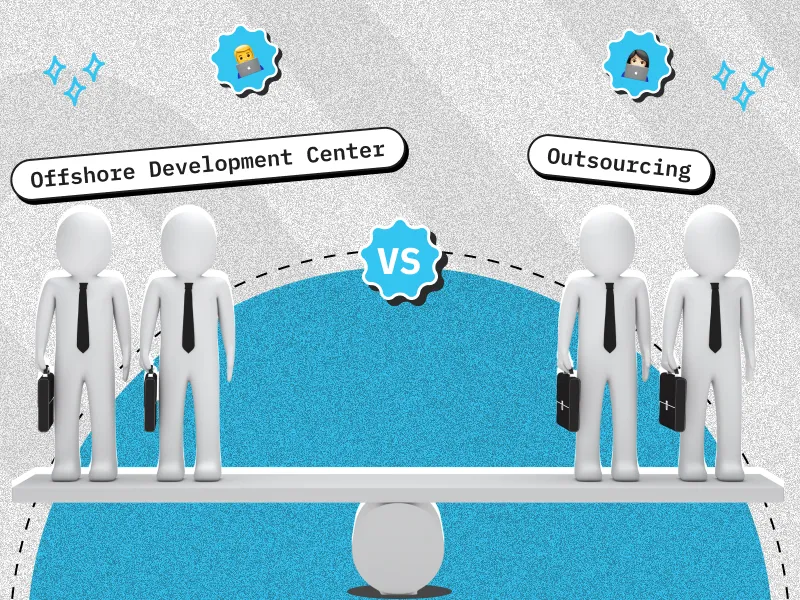Quick Summary
Offshore Development Centers (ODCs) offer significant benefits in 2025, including cost efficiency, access to global talent, scalability, and faster time-to-market. They allow businesses to focus on core activities, mitigate risks, and improve innovation and productivity. While challenges like communication barriers and security concerns exist, they can be managed through clear communication, robust security measures, and effective project management. ODCs are essential for businesses aiming to scale, innovate, and stay competitive in the global market.
Introduction
In the current times, where businesses are focusing to innovate, adapt, and scale efficiently, Offshore Development Services have emerged as a transformative strategy. These services are no longer just about reducing costs—they have become a key enabler of global competitiveness. As we step into 2025, the relevance of offshore development is only growing stronger, reshaping how organizations approach software development, resource management, and market expansion.
One of the primary distinctions between offshore development and traditional outsourcing is the level of control and commitment involved. Offshore development implies setting up an Offshore Development Center where a dedicated team works exclusively for the client, aligning more closely with the company culture, goals, and methodologies. This model ensures higher quality, improved communication, and better integration, making offshore development an advanced choice over the conventional outsourcing model.
This blog explores the top 10 benefits of Offshore Development Services that go beyond the obvious cost savings. From scaling seamlessly with your business needs to accelerating project timelines and tapping into global expertise, these benefits provide a compelling case for why ODCs are the cornerstone of success for forward-thinking enterprises in 2025. Dive in to discover how offshore development can help you stay ahead in the game and redefine your approach to growth and innovation.
Top 10 Benefits of Offshore Development Services
1. Cost Efficiency Without Compromising Quality
Offshore Development Services have become synonymous with cost-effective solutions that do not compromise on quality. Businesses can drastically reduce operational and development costs by hiring skilled resources from countries where labor is more affordable. This means accessing proficient developers, engineers, and specialists at a fraction of the cost of local talent, enabling companies to allocate savings to other critical business areas, such as marketing, R&D, or infrastructure.
2. Access to a Global Talent Pool
Offshore development offers unparalleled access to a diverse and global talent pool. Companies can bring in experts who specialize in niche technologies, tools, or domains that may be scarce or prohibitively expensive locally. This allows businesses to stay ahead of the curve in technological innovation, leveraging specialized skills and fresh perspectives from across the world to solve complex problems efficiently.
3. Scalability and Flexibility
The scalability and flexibility offered by offshore services are game-changing for modern businesses. Whether it’s a small startup scaling quickly to meet demand or an enterprise that needs to downsize its development team after a project ends, offshore services provide seamless adaptability. This eliminates the challenges of permanent hiring or layoffs, giving businesses the agility they need to thrive in dynamic markets.
4. Faster Time-to-Market
Time zone differences become a competitive advantage in offshore development. While your local team wraps up for the day, your offshore team begins work, creating a 24/7 development cycle. This continuity not only accelerates project timelines but also ensures rapid troubleshooting and quicker iterations, helping businesses deliver products to market faster and meet tight deadlines with confidence.
5. Focus on Core Business Activities
Outsourcing non-core activities to offshore teams allows companies to focus on their strategic goals and primary operations. By freeing internal resources from the burden of managing day-to-day development tasks, businesses can channel their energy into innovation, strategic planning, and building a competitive edge in their respective industries.
6. Risk Mitigation
Diversifying team locations through offshore development reduces the risk associated with local disruptions, such as natural disasters, political instability, or market fluctuations. Reliable offshore partners can also share risks, providing a safety net for unexpected challenges. This geographical and operational diversification fosters resilience, ensuring uninterrupted progress.
7. Quality and Innovation Improvement
Offshore teams are often driven to maintain high standards in both coding practices and project execution to stay competitive in the global market. Many offshore developers bring fresh ideas, innovative methodologies, and emerging technologies to the table, ensuring that the projects they handle benefit from the latest advancements and best practices.
8. Enhanced Productivity and Efficiency
Offshore teams are focused and result-oriented, with clearly defined roles and responsibilities. This specialization leads to better resource allocation and streamlined project management. Offshore developers often work in environments optimized for productivity, delivering high-quality outputs within deadlines and exceeding expectations.
9. Access to Advanced Technologies
Partnering with offshore teams provides businesses access to modern technologies and tools, such as AI, blockchain, cloud computing, and IoT. Offshore developers are typically well-versed in leveraging these advanced frameworks, enabling companies to stay technologically relevant, experiment with emerging trends, and innovate without the burden of upfront investment in training or infrastructure.
10. Improved Business Scalability and Competitiveness
Offshore development creates opportunities for companies to scale their operations without significant upfront costs. By expanding capabilities through offshore partnerships, businesses can explore new markets, diversify offerings, and remain competitive. The flexibility to innovate and adapt quickly allows companies to respond effectively to evolving customer demands and industry challenges, securing their position as industry leaders.
Read More: In-House Team vs. Offshore Development Center: Key Differences
Challenges and How to Overcome Them
Key Challenges:
- Communication Barriers
Differences in language proficiency, time zones, and communication styles can lead to misunderstandings, delayed responses, or incomplete information sharing. This often hampers collaboration and slows down project progress. - Cultural Differences
Working with teams from different cultural backgrounds can sometimes result in misaligned work ethics, decision-making processes, or approaches to problem-solving. This disparity may affect team cohesion and productivity. - Security and Intellectual Property (IP) Concerns
Sharing sensitive data, proprietary tools, or intellectual property with offshore partners introduces risks related to data breaches, unauthorized access, or misuse of information. Without adequate measures, businesses may compromise their competitive edge. - Lack of Control and Visibility
Managing an offshore team remotely can create a sense of detachment. Companies may find it challenging to monitor progress, enforce standards, or align goals, especially when there’s limited face-to-face interaction. - Onboarding and Knowledge Transfer Delays
Transitioning knowledge to offshore teams and ensuring alignment with the project vision can take time, especially for complex projects. Delays in onboarding can lead to slower project initiation. In order to partially address these concerns, companies may opt for collaboration with EOR in Eastern Europe, Asia, or other offshore tech hubs.
Solutions:
Addressing these challenges proactively can turn potential roadblocks into opportunities for building robust and effective offshore collaborations:
- Thoroughly Vet Offshore Partners
Perform due diligence when selecting offshore development partners. Evaluate their technical expertise, track record, communication practices, and cultural compatibility to ensure they align with your organization’s goals and values. - Establish Transparent Communication Channels
Use collaboration tools like Slack, Microsoft Teams, or Zoom to maintain clear, consistent, and real-time communication. Schedule overlapping working hours for discussions and encourage detailed documentation to reduce ambiguity. - Implement Agile Methodologies
Agile practices like regular standups, sprint planning, and iterative reviews foster collaboration and accountability. These practices ensure that everyone remains aligned and responsive to changes, despite geographical or cultural differences. - Foster Cultural Awareness and Inclusion
Conduct cross-cultural training sessions for both in-house and offshore teams. Encourage mutual respect and understanding of diverse work styles to build a cohesive team environment. - Strengthen Security Measures
Invest in robust security protocols, including data encryption, access control, and secure file-sharing platforms. Sign comprehensive NDAs (Non-Disclosure Agreements) and ensure that offshore partners adhere to international compliance standards, such as GDPR or ISO. - Maintain Regular Monitoring and Reporting
Use project management tools like Jira, Trello, or Asana to track progress, monitor deliverables, and maintain transparency. Schedule periodic review meetings to assess milestones and address potential bottlenecks promptly. - Streamline Onboarding and Knowledge Transfer
Develop comprehensive onboarding manuals and conduct orientation sessions to familiarize offshore teams with your processes and tools. Assign a dedicated liaison to bridge the gap and ensure smooth knowledge transfer. - Leverage Time Zones Strategically
Plan tasks strategically so that one team can hand off work to another as their day ends, creating a seamless 24-hour development cycle. This approach minimizes downtime and accelerates delivery.
Future Trends in Offshore Development Services for 2025
The future of offshore development will witness significant trends impacting how businesses operate:
- AI and Machine Learning Integrations: The growing incorporation of AI in development processes will enhance predictive analysis and automation in projects.
- Rise of Hybrid Working Models: Combining the best of remote and in-person collaboration, hybrid models will become prominent, enhancing team flexibility and efficiency.
- Focus on Sustainability in Software Development: An increased emphasis on sustainable practices and eco-friendly development will gain traction, as consumer awareness continues to rise.
Key Considerations for Hiring Offshore Developers
When looking to embark on offshore partnerships, businesses should:
- Evaluate Experience and Portfolio: Choose partners with a proven track record in your industry.
- Ensure Effective Communication Channels: Use reliable tools and processes to maintain clear communication across all stakeholders.
- Flexibility in Scaling Teams: Opt for partners who demonstrate flexibility in scaling teams based on project phases and demands.
Conclusion
The numerous benefits of Offshore Development Services provided by Offshore Development Centers present compelling reasons for businesses to adopt these strategies in 2025. From cost-efficiency to agility and innovation, the advantages are multifaceted and invaluable for maintaining a competitive edge. Embracing an offshore development center ensures that your business is well-positioned for growth, excellence, and sustained success. Begin exploring potential offshore partnerships to harness these benefits, streamline operations, and drive your business towards thriving in the global market.
Frequently Asked Questions (FAQs)
How do offshore development services reduce costs?
Offshore development reduces costs by employing skilled resources from regions with lower living costs, allowing for reduced operational expenditures without compromising quality.
What are the common risks associated with offshore development?
Risks include communication challenges, cultural differences, and security concerns, all of which can be managed with thorough partner evaluation and proper project management.
How to ensure quality in offshore software projects?
Ensuring quality involves selecting partners with a strong track record, establishing detailed project expectations, and using effective communication and quality assurance processes.
What industries benefit the most from offshore development?
Industries like IT, finance, healthcare, manufacturing, and e-commerce frequently benefit from offshore development due to their high demand for innovation and scalability.
What are offshore development services?
Offshore development services refer to the practice of outsourcing software development and IT services to teams located in other countries, often to take advantage of lower costs, specialized talent, and enhanced scalability. These services can include software development, mobile app development, web development, IT support, and more.
What is the purpose of ODC?
The purpose of an Offshore Development Center (ODC) is to provide businesses with a dedicated, remote development team located in a different country, offering benefits like cost savings, access to global talent, flexibility, and scalability. ODCs allow companies to focus on their core operations while leveraging external expertise for software development and other technical services.
Where can I find an offshore development team?
Offshore development teams can be found in various countries with established IT and software development industries, including India, Ukraine, the Philippines, China, and Eastern Europe. Companies can find offshore teams through outsourcing platforms, consulting firms, or by directly partnering with offshore development companies that specialize in the services you require.
What is offshoring in software development?
Offshoring in software development refers to the practice of hiring a development team or outsourcing software development projects to companies in other countries. This is typically done to reduce costs, access specialized talent, and increase efficiency. Offshoring can involve setting up an Offshore Development Center (ODC) or working with third-party providers based in different geographical locations.











 30 mins free Consulting
30 mins free Consulting 
 13 min read
13 min read 







 Love we get from the world
Love we get from the world 